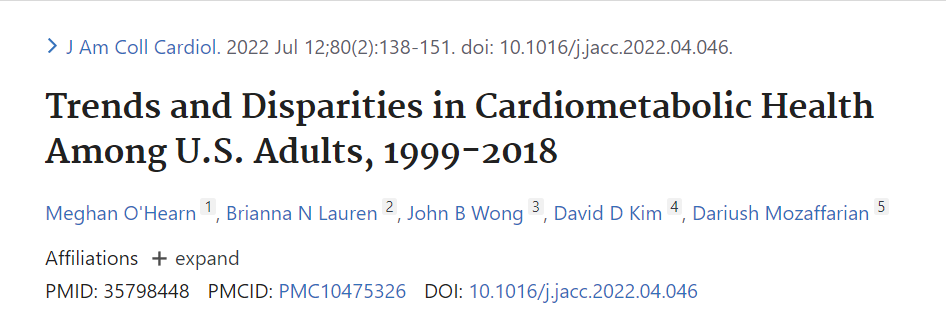Trends and Disparities in Cardiometabolic Health Among U.S. Adults

Hey Team, it's Sean Davis here!
Welcome back to The Peptide Insider—your one-stop-shop for insights, revelations, and everything you never knew you needed to know about peptides, hormones, and, of course, cardiometabolic health trends. And yes, we’re adding a sprinkle of humor because, well, why not?
What's Up with Cardiometabolic Health?
Buckle up because we’re diving deep into an eye-opening study, "Trends and Disparities in Cardiometabolic Health Among U.S. Adults, 1999-2018," Yes, it’s real and yes, it’s important. Also, kind of shocking! Here are the juicy bits:
- Overall Cardiometabolic Health:
- A dismal 6.8% of U.S. adults had optimal cardiometabolic health in 2017-2018, down from the previous decades. In simple terms: we’re not doing so hot, folks 1.
Cardiometabolic refers to chemical processes that affect the cardiovascular system. Cardiometabolic diseases are a group of common conditions that are often preventable and can include:
- Heart attack
- Stroke
- Diabetes
- Insulin resistance
- Non-alcoholic fatty liver disease
- Chronic kidney disease
- Adiposity and Glucose Levels:
- Optimal adiposity plummeted from 33.8% to 24.0% and glucose levels dropped from 59.4% to 36.9% 2. Yikes! Pass the salad.
Optimal adiposity includes body mass index (BMI), waist-to-hip ratio (WHR), and fat mass index (FMI):
- Blood Lipids:
- Here’s a sliver of good news—optimal blood lipids actually improved from 29.9% to 37.0%, while those poor levels decreased from 28.3% to 14.7% 3.
- Disparities:
Why You Should Care—And How GLP-1 Can Help
Now, I know what you’re thinking: "Sean, this sounds critical, but isn’t GLP-1 the superhero in tight spandex here?" Absolutely, and here’s why:
GLP-1 agonists—those nifty peptides everyone’s talking about—are not just chatter. They’re game-changers. Beyond appetite suppression, we've got promising results in improving blood glucose and lipid profiles—key players in the cardiometabolic dumpster fire we’re currently experiencing.
Imagine Batman swooping in just as Joker’s about to push the button. Yeah, GLP-1 is that level of awesome.
Wrap-Up
It’s not all doom and gloom because, with the right tools—certainly, GLP-1 among them—we can turn the tide. Get out there, educate yourself, reel in some of that peptide goodness, and let’s start making changes, one peptide at a time.
Catch you next month!
Sean Davis
The Peptide Insider
Remember, always trust your gut—just feed it right.
